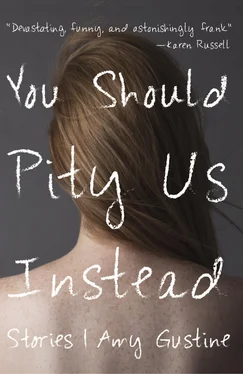“Looks well fed,” Dobry said, scratching the hard spot between the cat’s ears.
“Well, they are predators,” Caroline said, seeing too late she’d forgotten to bring in the plate on which she’d left a smear of butter and ham rind that morning. It gave an odd satisfaction, having something wild, unreachable through logic or language of any kind, decide it needed you.
In Poznań Caroline’s mother owned a white cat named Silk with blue eyes and an unusually long tail she used the way a ballerina does her arms. Silent and indifferent to verbal commands, the cat perfectly suited her mother, who had gone deaf at the age of four from scarlet fever and talked as if she had a marble on her tongue. She never used sign language because Caroline’s grandmother thought it the recourse of the mentally deficient and had swatted her if she ever so much as gestured.
Caroline’s father was a chemist. He’d been born with a deformed left arm, the hand a mere nub of tissue just below what should have been his elbow. He had a dog named Atlas — a black and brown shepherd with triangular ears that stayed upright even while napping — whom he’d trained to open doors. At the chemist shop and around town, if her father was carrying something in his good hand, Atlas would grip the doorknob with his mouth and twist, leaving teeth marks behind in the wooden knobs.
Caroline remembered her mother having all the knobs in their house changed to smooth, metal spheres on which Atlas couldn’t gain any purchase. In retaliation her father had taken all the pens and pencils out of the house, forcing her mother to make herself understood with verboten gestures and futile attempts at proper pronunciation.
It was only after Caroline escaped to America and had to consider what she herself could expect from life — just another foreigner with a strange accent whose education and family lineage meant nothing — that she had begun to understand the seed of her parents’ bitterness and resentment toward one another. And only now, in the time she’d had to think since Frederick died, had she finally found a single word for it: humiliation.
The next week the weather grew much colder and the cat began to cry at the back door. One night, when Caroline reached outside with the saucer, it darted inside. She couldn’t find the thing until those glowing eyes gave it away, huddled beneath the dining room table. Caroline moved the chairs out and scolded, “You weren’t invited in. What’s the matter with you?” She clapped her hands and the cat ran. It took several minutes to herd it toward the door and finally out into the dark.
The next day was colder again. Snow fell for an hour in the morning, then melted in the afternoon sun. The cat sat under the awning on the concrete slab of patio with its paws tucked tight against its body. At the kitchen window, Caroline shook her head. If she had allowed herself to indulge in the fantasy of cats having emotions, she might have said the cat seemed hurt by her treatment the day before. It refused to come onto the porch for its milk, and didn’t meow when she poked her head out. It just looked at her a moment, then sat down, staring across the wet grass to the dark, dirty street beyond the fence.
The rest of the day Caroline tried to forget about the cat, and when she looked out around four o’clock, it was gone.
The last summer Caroline lived in Poland, after she’d finished school, her mother began a list of men — old men, young men, all rich men. She wrote them in her large, calligraphic script right across the printed text on pages torn from her father’s books, then stuck the pages to the walls in Caroline’s room with a paste made from flour and water. If the men were older, the rituals of questions and answers were private, passed among friends who knew friends who knew the man in question. If the men were Caroline’s age, her mother would invite their mothers for tea.
In July, during the hottest part of the summer, her mother didn’t allow anyone to open a window because of the flies, so when these women came, they sat in the formal parlor with the still air like a warm, moldy cloth across their faces.
The visits were an effort for Caroline’s mother, requiring all her attention and focus. Her words were practiced, nearly identical from tea to tea, lady to lady, and they were few. While the other woman talked, Caroline’s mother had to stare at her mouth to read her lips. Some people seemed to take offense at this, though they knew the reason. Hence there were long awkward silences in which the mothers would turn and smile at Caroline as if she were a picture on the mantel, and that was the face Caroline put on, the one she held for portraits, a mindless smile with fixed, wide eyes. Once in a while a boy’s mother would deign to ask Caroline a question, but she was always careful to answer while looking at her own mother so her lips could be read. As she talked, she studied her mother’s gray eyes, flecked with blackish-blue, the color of bruises before they turn, and tried to figure out if the narrowness was the study of pleasure or disgust.
During the meeting her mother would stroke Silk, who lay stomach down across her lap, paws dangling over her knees. At the end of the meeting, if things didn’t go well — which mostly they did not — her mother would snatch the paper she’d written the man’s name on off Caroline’s wall, ball it up and slip it up her sleeve.
After her mother began the husband search, Caroline’s father came into her room and stared at the papers. “My prospects,” Caroline muttered. “Mother did it.”
Her father nodded, then peeled one of the pages off the wall and licked its back. “That’s the good flour,” he said with disgust.
Caroline never heard her father talk to her mother about the papers on her wall, the flour, or anything else. He rarely spoke to her at all. Dare Caroline allude to this, he scowled and shook his head. “Why would I do that? How do I know what she thinks I’m saying?”
After the husband search began, her father began to move through the house as soundlessly as her mother, as if he didn’t need to fidget with locks or open doors like the common man, as if his useless arm were like a fin to a fish, letting him slip through the world silently, effortlessly, on his way to somewhere else. And just as quietly, he would open every window in the house to let the flies in. For hours afterward her mother stalked the floor, swatting with a magazine or newspaper, Silk trailing behind, pawing at the black corpses. One time Caroline’s mother broke her favorite vase. It was the only sound, that cracking china, all evening long.
After Caroline had children of her own and their noise filled the house, she realized she had often felt as though she didn’t exist in her parents’ bitter silence and that the invisibility had seduced her. She didn’t want to contradict it. Sometimes her own girls would jump when she came into a room behind them. “Mother,” they’d complain, “why can’t you make noise like a normal person! It’s like having a snake in the house.”
By the end of the week the cat had forgiven her and come back up to the porch for its twice-a-day milk and scrap of food. Caroline’s neighbor, Mildred Putramack, must have been watching her feed it all along. She came out on her porch. “Giving something to an animal, huh? Not enough food for us, even.”
Caroline was not unaware of her good fortune — a generous pension from Frederick’s company and a patent on a glassblowing technique he’d invented. The house was paid for and her needs had shrunk as she grew older. Shopping had become more a chore than a pastime. Recently she’d gone downtown to buy a new pair of hose and seen men on the courthouse lawn in pup tents, others sitting on stools selling handfuls of pencils, bushels of apples, and ears of corn.
Читать дальше












